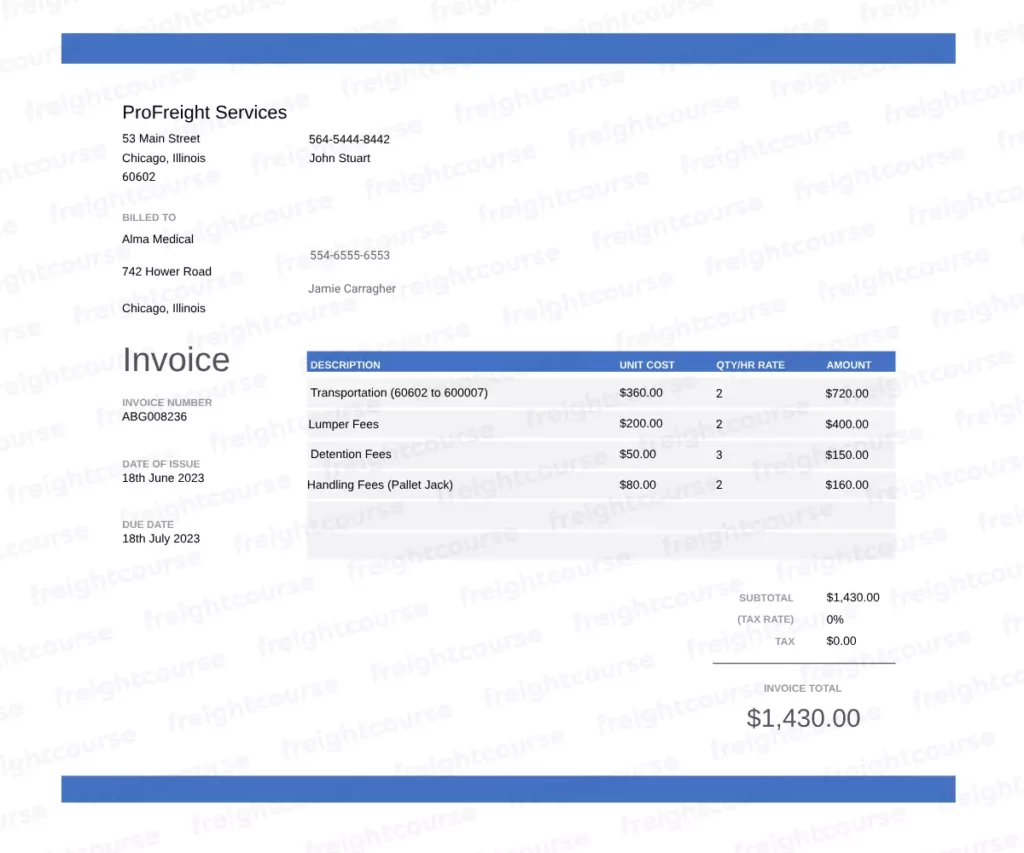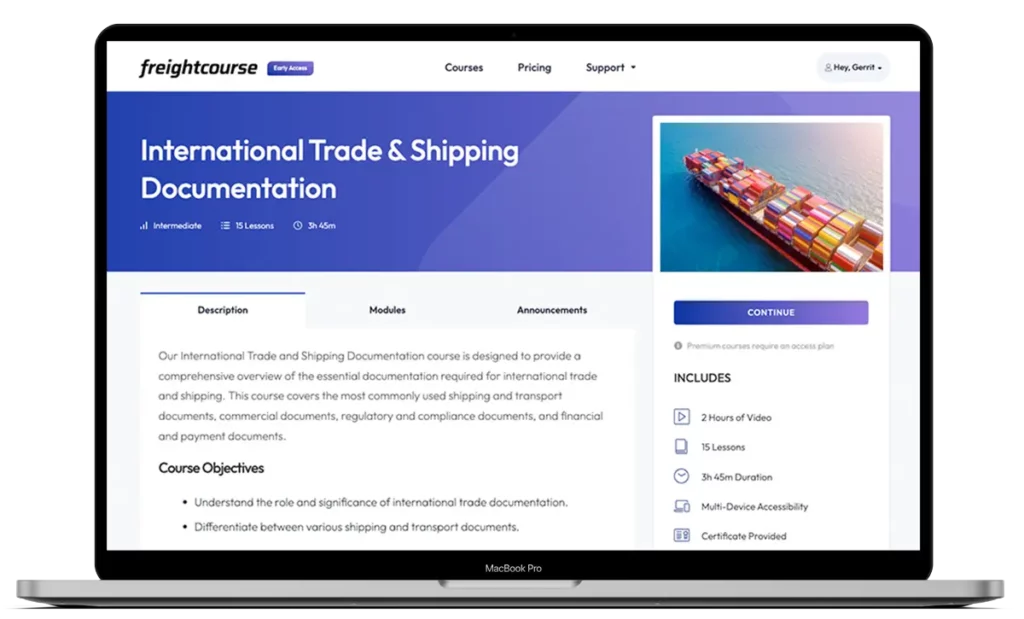Some shippers, though experienced and knowledgeable in their respective industries, may lack a comprehensive understanding of the complexities involved in freight transportation. In many cases, the lack of trucking industry knowledge can lead to disputes, especially when shippers or receivers incur freight charges that exceed their expectations.
As a result, understanding trucking invoices have become more crucial than ever. These essential financial documents outline every charge in detail to ensure shippers and receivers know what they’re paying for when transporting their goods.
By gaining a deeper understanding of trucking invoices, they can better manage their expenses and prevent or resolve billing disputes. In this article, we’ll explain everything you need to know about trucking invoices and what charges they contain.
What Is A Trucking Invoice?
A trucking invoice is a financial document that trucking companies and owner-operators use to outline the charges associated with transporting goods for shippers and receivers.

These invoices are typically raised by a trucking company or an owner-operator and serve as a request for payment, containing all relevant information required for the process, including the shipper and consignee details, load type and details, freight charges, accessorial charges, and payment terms, among various others.
For all parties involved, trucking invoices serve as an effective tool to track expenses, resolve disputes, and ensure compliance.
What Type of Information Do Trucking Invoices Contain?
You can find a variety of invoice formats in the market. While every carrier has its preferences on what information an invoice should contain, you’ll find a general list of the most common information below.
- Customer Details – Every trucking invoice contains information about the shipper or consignee (payer), including the company name, address, and contact details.
- Trucking Company Details – The next item on the invoice typically includes the carrier’s details (payee), which include the company name, address, and contact information.
- Invoice Number – A trucking invoice number is a unique sequence of alphanumeric characters that trucking companies assign to invoices. These numbers are usually generated by a Transport Management System (TMS) and are sequential. While the invoice number acts as a unique reference number, it is also used for managing payments, as well as tax and accounting purposes.
- Date of Invoice – The date on a trucking invoice represents the date the invoice was raised. This data is not the be confused with the invoice due date.
- Transportation Information – Transportation information typically includes essential details related to the load, such as the origin and destination, purchase order/reference number, weight and dimensions, quantity, and more.
- Transportation Charges – Transportation charges are the costs that a trucking company charges for transporting goods from one location to another. These charges may vary depending on the freight mode, such as full truckloads (FTL), partial truckloads (PTL), and less-than-truckloads (LTL).
- Accessorial Charges – Truckers charge additional fees for services beyond standard transportation, such as lumper services, detention, equipment rental, off-hours deliveries, and similar.
- Taxation – A tax charge on a trucking invoice refers to the amount of tax that is applied to the grand total.
- Additional Notes – Additional notes are special instructions or notes related to a shipment or billing. For instance, a trucking invoice could include the cargo insurance details or any special requests that were accommodated.
- Payment Terms – Payment terms specify the conditions that the shipper or consignee is required to adhere to, which include the payment method and due date. For instance, some carriers ask for cash on delivery (COD), while others offer 30 or 60-day credit terms.
- Terms & Conditions – Terms and conditions on a trucking invoice typically contain information related to dispute resolution, liability limitations, late payment penalties, force majeure, and more. They ultimately serve to establish a contractual agreement between the payer and the payee.
- Supplementary Documentation – Supplementary documentation could include signed receipts and documents showing proof of delivery.
List Of Accessorial Fees You May Find in Trucking Invoices
Some trucking services come with a broad list of accessorial charges, depending on the services that were rendered by the trucking company. Therefore, understanding the different charges on a trucking invoice is crucial for any type of business.

Apart from the cost of transporting cargo from one location to another (base transportation charges explain in the section above), shippers and consignees can incur the following additional fees.
Additional Stop Fees
Shippers and consignees are required to pay additional stop fees when their shipment has more than one destination. Multi-stop loads often lead to delays due to additional cargo handling, which can affect the overall productivity of truckers. To compensate for the productivity loss or lost hauling opportunities, carriers typically charge a variable percentage.
Advance Notice Fees
An advance notice is a type of document trucking companies use to register pending transactions and alert consignees about future deliveries. An advance notice fee is simply the charge for the additional administrative work.
Cross-Border Fees
A cross-border fee is a small amount charged by carriers moving cargo for clients across borders. This amount typically covers custom fees, duties, taxes, and the additional work involved during the transition. For instance, trucks transporting goods between the United States and Mexico usually undergo inspections at borders, which can lead to extensive wait times and affect any carrier’s productivity.
Detention Fees
Detention fees are charges shippers and consignees pay carriers for exceeding the free waiting time (typically two hours) that is used for loading and unloading. This fee is designed to compensate the carrier for the loss of productivity.
Fuel Adjustment Fees
Fuel adjustment charges are surcharges carriers add to a trucking invoice to account for fluctuations in fuel prices. Carriers take the current fuel price and subtract it from the fuel price baseline taken from their operating cost figures. They then simply divide the difference by their average miles per gallon. For instance, if the surcharge is $0.50 per mile, a 20-mile trip will incur a fuel adjustment fee of $10.
Handling Fees
As the term suggests, a handling fee is a charge for cargo handling during loading and unloading. It may include the following:
- Crane Fees – Many carriers have to outsource cranes and other equipment to load/unload cargo. Cranes easily cost up to $1,000 for a single day of work, depending on the type. Some carriers own cranes and charge a small fee to carriers for handling their cargo using them.
- Liftgate Fees – Many warehouses and facilities are not equipped with loading bays. Therefore, they require a liftgate, which hydraulic platform carriers install on their trucks to raise or lower a shipment for convenient loading and unloading. Hence, the liftgate fee is the charge for either sourcing a liftgate from their asset inventory or via rental.
- Lumper Fees – Many shippers and consignees don’t have dedicated or sufficient labor to load and unload cargo. In this scenario, some carriers offer lumper services and charge a ‘lumper fee‘ for supplying third-party laborers to handle cargo.
- Pallet Jack Fees – Bringing a shipment into storage or any facility often requires additional equipment. One of the most common types of equipment is a pallet jack used to easily move heavy pallets. This is another service that comes at an additional cost as it saves receivers valuable time and additional manpower.
Hazardous Material Fees
The Department of Transportation (DOT) mandates carriers to properly document hazardous materials and provide the necessary resources to handle this specialized cargo. A hazardous material fee is an additional charge for the paperwork, special handling, and elevated safety risk. Most carriers typically charge between $200 and $500 for HazMat transport.
Layover Fees
A layover fee is charged by carriers when their truck cannot load or unload cargo on the originally scheduled day. This can be due to scheduling issues, staff shortages, equipment delays, or even congestion at the port or facility. Since it affects the carrier’s productivity, they typically charge between $200 and $500 per day.
Location-Related Fees
Carriers charge various types of accessorial fees for deliveries to specific locations, which are the following:
- Limited-Access Delivery Fee – Limited-access delivery fee is charged for pickup and delivery destinations that are restricted or limited to trucks. They can include schools, storage units, hotels, restaurants, religious centers, and hospitals.
- Metro/City Delivery Fee – Maneuvering large trucks on busy city roads, urban parking areas, and complex traffic conditions makes the process more difficult for truckers. Hence, they charge an additional fee for the extra time and effort taken for pickup or delivery.
- Residential Area Delivery Fee – Residential neighborhoods can be as complex as metropolitan areas. The roads are smaller, and the area has plenty of pedestrians and limited access locations. Hence, carriers charge an extra amount to compensate for the additional time taken for pickup and delivery.
- Others – Many carriers charge accessorial fees between $50 and $500 for locations that require them to wait more than the standard wait times, including distribution centers, airports, large events, trade shows, or similar locations.
Off-Hours Delivery Fees
Picking up or delivering cargo outside normal operating hours usually costs extra, especially when carriers face complications reaching the destination, such as traffic, limited access, or poor communication. So, they will charge between $100 and $300 to accommodate their overtime and fuel.
Oversized Cargo Fees
When a shipment, such as industrial equipment or construction materials, takes more space than the standard limit, carriers charge oversized cargo fees to compensate for any penalties charged by the authorities or the extra effort made to transport the cargo safely.
Packaging Fees
Packaging fees typically range between $50 and $100 per pallet. This amount is charged by carriers who have to wrap or package freight for transportation according to their client’s requirements.
Reclassification Fees
The reclassification fee is an amount high-volume LTL carriers charge for rectifying incorrect shipment details to avoid unnecessary delays or failed deliveries. It generally involves documenting and determining the shipment’s weight, classification, and dimensions to provide final freight rates to shippers.
It’s an additional service that takes time and labor. Therefore, it comes with an additional cost.
Re-consignment, Redirection, or Diversion Fees
Re-consignment is when a shipper or receiver changes the freight destination during transit. This prompts carriers to charge between $50 and $75 for the change in planning as well as redirection miles. Similarly, a diversion fee is charged when a shipment arrives at a facility, and the trucker is then asked to have it delivered to another location instead.
Redelivery Fees
Failed deliveries are fairly common in the trucking industry, especially in the retail and eCommerce sector. Shippers often require carriers to redeliver an order due to wrong addresses, unavailability of receivers, and other issues. It’s among the most common types of accessorial charges since it requires carriers to attempt subsequent delivery.
Reweigh Fees
Shippers usually incur reweigh fees when a carrier inspects and reweighs their shipment. If the cargo weight differs from the one mentioned on the Bill of Lading, the overall shipping cost will increase. In the case of LTL loads, if the cargo weight is incorrect, it may lead to an additional process of reclassification.
Security Fees
Carriers charge different types of security fees when transporting highly sensitive or high-value cargo, including:
- Escort Fees – Escort fee is the amount carriers charge to have a security escort accompany the driver as they transport your cargo to the destination.
- Confidentiality Fees – This is the charge for keeping the shipment details and invoice confidential.
Sort and Segregation Fees
Sort and segregation revolve around the practice of deconsolidating palletized cargo. This fee varies depending on the shipment size, weight, and type. For instance, handlers have to be more careful when moving hazardous or high-value products.
Stop-Off Fees
A stop-off fee is an additional amount carriers charge shippers looking to split their deliveries between two or more locations. For example, a beverage company can hire a carrier to supply cased beverages to multiple stores or restaurants in a specific area.
Storage Fees
In many cases, shippers or receivers ask carriers to temporarily store their cargo due to space constraints at their facilities, labor or equipment shortages, or other reasons. Storage fees are the hourly or daily amount charged by carriers for holding cargo.
Toll Fees
A toll is a legal fee every US state requests truckers to pay for the right to access certain highways, roads, borders, or passages. Carriers usually pass on the fee to shippers and consignees to promote transparency and safeguard themselves from toll price fluctuations.
Truck Order Not Used (TONU) Fees
Finally, a TONU fee is the charge carriers bill to shippers or receivers who cancel their shipment on the day of pickup or delivery before loading or unloading after all the terms have been agreed to and signed off on. Shippers and consignees are often charged $150-$300 unless they cancel their shipment with early notice.

Get Free Course Access
If you enjoyed the article, don’t miss out on our free supply chain courses that help you stay ahead in your industry.

Andrew Lin
Co-Founder & Writer
at freightcourse
About the Author
Andrew is a multi-business owner with over 12 years of experience in the fields of logistics, trucking, manufacturing, operations, training, and education.
Being the co-founder of freightcourse has given him the ability to pursue his desire to educate others on manufacturing and supply chain topics.
Follow us